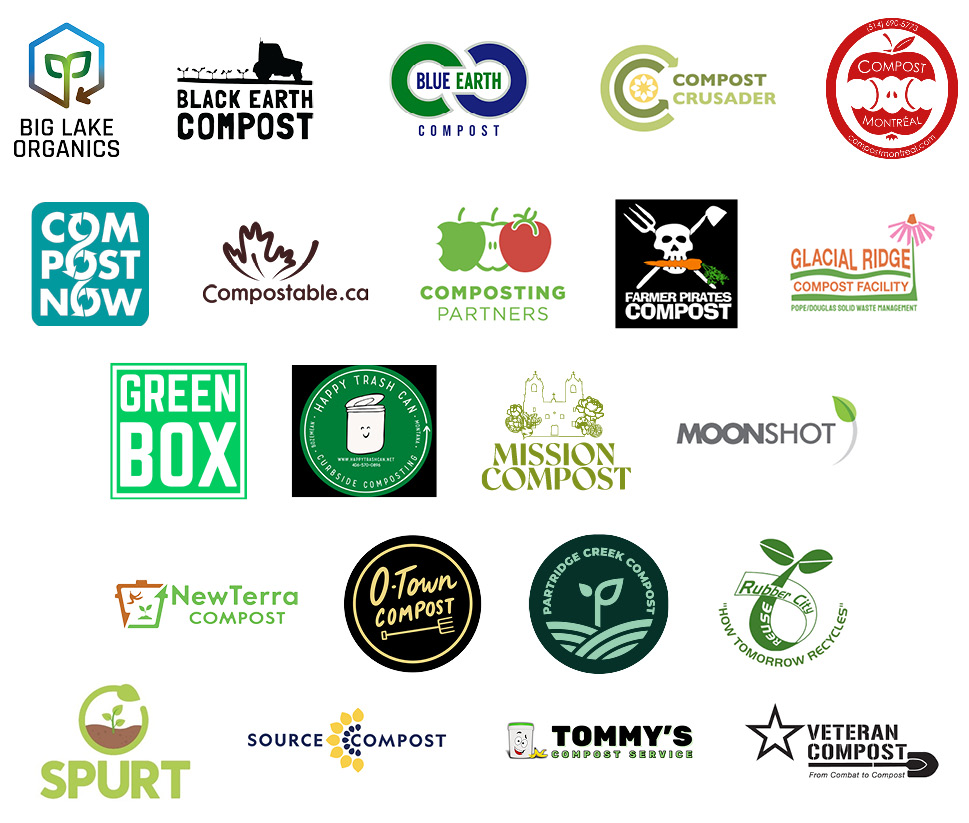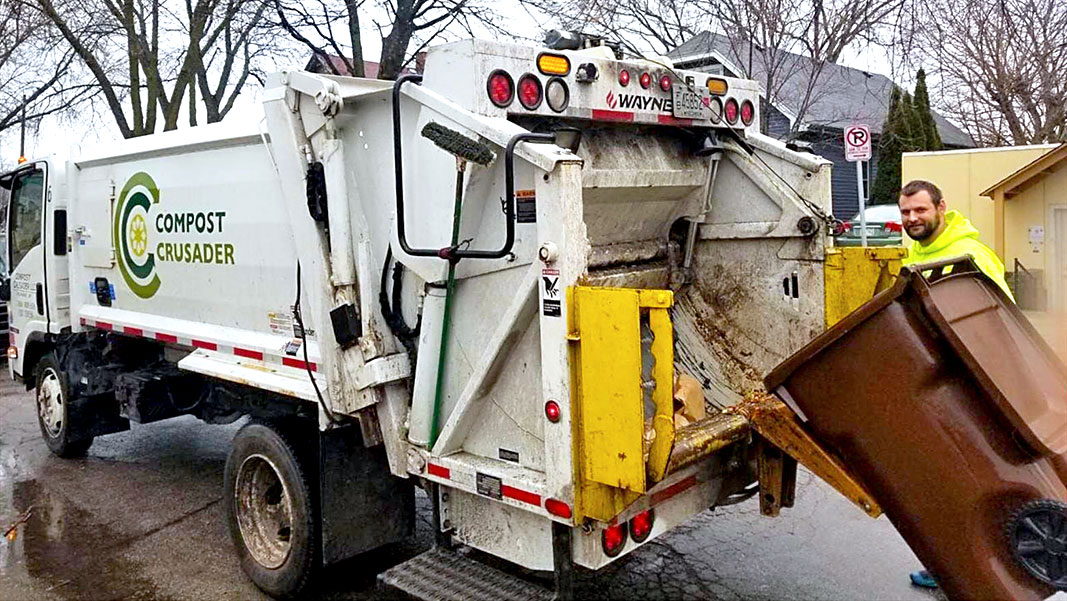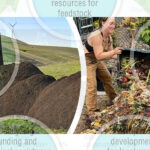Top: Working with local composting facilities means viewing haulers’ collection vehicles as the front door of the compost facility. Photo courtesy of Compost Crusader
Melissa Tashjian, Chris Wood and Michael Ryan
Anyone involved in the collection, consolidation, and composting of food waste knows that some controversy exists around the appropriate role of third-party certified compostable packaging. For some in the industry, it may feel like the loudest voices are the staunchest critics of compostable packaging or the strongest promoters of its beneficial use.
Organics haulers have seen how the careful use of compostable packaging can drive maximum participation by people seeking to keep food waste from landfills. We want to promote a “third way” in this discussion, between the two positions on either extreme. We believe this third way already operates across the United States, and we are seeking to draw attention to the activities that already make it possible. Our goal is to provide a roadmap for others.
Certified compostable products are proven to break down, as evidenced by studies and data from the Compostable Field Testing Program, Closed Loop Partner’s Composting Consortium, and other industry leaders, including professional organizations that provide third-party certification.
We believe that all compost manufacturers and organics haulers should have the option to operate a business that maximizes their environmental and financial sustainability. Our commitment is to share openly what works and to invite others to join us in this important conversation.
A “Third Way” Roadmap
Composting food waste requires three distinct groups to work together:
- Generators: People who generate and source separate food waste
- Composters: People who operate community or large-scale compost facilities
- Haulers: People who manage the logistics of moving the food waste from the generators to the composters
Haulers, many who also compost themselves, commonly work with generators who want to include single-use compostable products with their food waste stream and with composters who will accept compostable products, often only when certain conditions are met first. To fully realize the benefits of compostable packaging, while addressing the challenges faced by composters, the composting professionals who endorse this letter practice and support the following key actions that are outlined below — essentially, our Roadmap.
1. Go Beyond Education
It’s not enough to passively educate. Haulers have the unique opportunity to help generators of food waste create effective programs through practical consultation throughout program design, including the development of appropriate signage, onsite education, and reeducation over time. These efforts can create a contamination-free feedstock and support creation of marketable compost. Time spent creating thoughtful programs reaps dividends for the lifetime of a diversion program.
2. Embrace Accountability
Working with local composting facilities means viewing haulers’ collection vehicles as the front door of the compost facility. Haulers instinctively know that any program’s success means guiding generators to use only compostable packaging that serves the goals of their local compost facilities. By aligning collection practices with composters’ needs, haulers can enhance processing efficiency and minimize operational challenges. Many haulers compost themselves and accept compostable products as their everyday practice, and do so with minimal contamination challenges.
3. Use Only Packaging That Meets Rigorous Third-Party Testing Standards
Evidence from field studies shows that properly certified compostable packaging can effectively break down under appropriate conditions, contributing to high-quality compost outputs. With proper product identification, haulers and composters are able to compost certified compostable products and limit contamination by non-compostable and non-certified landfill-only imposters.
4. Dispel Contamination Myths
Research has shown that the decision to accept or reject compostable packaging does not significantly impact contamination rates at composting facilities. Instead, contamination levels are influenced by other factors, such as public education, operational practices, and enforcement of proper sorting standards. Recognizing this dynamic can shift the focus to maximizing recovery of compostable materials while managing contamination effectively. An established relationship with a local hauler, coupled with process enhancements like a contamination fee structure, can hold these haulers accountable for helping create clean feedstock for composters.
5. Embrace High-Volume, Public Settings
Certain settings, such as sports stadiums, event centers, and large-scale food service venues, inherently rely on disposable serviceware to meet operational demands. Utilizing compostable packaging in these environments not only provides a sustainable alternative to conventional disposables but also increases the recovery of food waste. When packaging and food waste are composted together, it simplifies sorting for patrons and maximizes the volume of organics diverted from landfills. This is most effective when all of the material presented to the patron is certified compostable. Properly labeled containers are available to make it easy for patrons to put compostables in the right bin.
6. Support Public Funding For Infrastructure Improvements
Compost facilities deal with contamination, whether or not they elect to accept compostable packaging. Due to this constant pressure, successful compost manufacturers depend on adequate infrastructure to manage contamination and process materials effectively. We encourage states and municipalities to invest in infrastructure improvements at private compost facilities. Public-private partnerships, grants, and funding programs can provide the necessary resources to enhance sorting technologies, contamination removal systems, and facility operations. Such investments will help scale composting capacity while mitigating contamination impacts.
7. Support Compost Quality And Diverse Uses
High-quality, nutrient-rich compost is suitable for many uses, including for all types of agricultural purposes. The inclusion of certified compostable packaging can also bring benefits to the compost process. These products can help as a bulking agent in the piles, allowing for greater airflow in the piles and aiding in the breakdown of material. They can also act as a source of carbon, helping to balance the composition of compost piles.
We believe that compost created using traditionally accepted methods, even including compostable packaging, can be valuable for applications including organic farming, sports turf management, residential gardening, green roofs, urban farming, traditional agriculture, commercial landscaping, and erosion control.
We know that the U.S. Department of Agriculture (USDA) has prohibited the inclusion of any compostable packaging as an ingredient in compost made for use in organic agriculture. While we believe that the USDA is doing its best to act in the best interests of consumers, we believe that continued research will reduce these limitations over time. Expanding markets for compost for all of these uses ensures that compostable packaging can contribute to sustainable waste management while maintaining high standards for end-use quality.
8. Acknowledge The Wide Spectrum of Acceptable Composting Practices
No two composters produce compost exactly alike. The opportunities and challenges that accepting compostable packaging present impact composters differently, depending on a number of factors including their location, local ordinances, and local infrastructure — and the availability of local haulers. Haulers successfully collaborate with composters across the country to manage compostable packaging.
9. Invest In The Circular Economy
The circular economy requires investment, which implies it must also generate a return. For food waste diversion and composting, that means businesses must be both environmentally and financially sustainable. The best way haulers can ensure that compost facilities receive a clean stream of organic waste when it also includes compostable packaging, is to be closely involved in the food waste generators’ selection of packaging. This means focusing first on reuse, and then cost-effective and sustainable selections for packaging. Many haulers have found it is useful, and in some cases profitable, to offer certified compostable packaging to their customers. When interests are aligned around helping composters generate marketable compost, all parties can work together to drive the most sustainable results.
We encourage our industry and government leaders to advocate equally on behalf of composters who choose to exclude compostable packaging and those who choose to accept it. We believe supporting the diversity of operational approaches a composter may choose to profitably operate their business and by creating nutrient-rich compost is the best way to help our communities to divert the most organics from the landfill.
If you want to learn more, reach out to us, we’d be happy to point you in the right direction.

Melissa Tashjian is founder of Compost Crusader, an organics hauler established in 2014. She is passionate about organics hauling and processing and excited to have open conversations about all things associated with the compost industry. Chris Wood is a co-founder of Moonshot Compost. Founded in Texas in 2020, Moonshot collects and consolidates food waste for composting in Austin, Dallas/Fort Worth, Houston, and Waco. Michael Ryan is the co-founder of NewTerra Compost, an industrial composting company based outside Chattanooga, Tennessee, that helps facilities divert food waste and transition to certified compostable products in place of single-use items.










